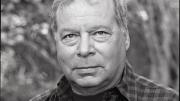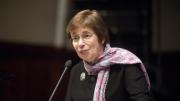August Kleinzahler will be the poet, and Linda Greenhouse the orator, at the Phi Beta Kappa Literary (PBK) Exercises—the first formal community event of Commencement week, and in many respects the intellectual core of the festivities for College seniors and their families. Students elected to PBK will also honor faculty members for outstanding teaching during the ceremony. The exercises are scheduled for 11:00 a.m. on Tuesday, May 28, in Sanders Theatre.
A Poet of Fort, Lee, New Jersey, and San Francisco
August Kleinzahler—born in Jersey City and raised in Fort Lee, New Jersey; educated at the Horace Mann School in New York City, the University of Wisconsin, and the University of Victoria, in British Columbia; and now a resident of San Francisco—has been honored for his many books of poetry with a Guggenheim Fellowship, an American Academy of Arts and Letters Award in Literature, and a Berlin Prize Fellowship. Sleeping It Off in Rapid City (2008), collecting earlier poems and new work, won the National Book Critics Circle Award. In a review for The New York Times, professor of English Stephen Burt wrote:
…drawn by wanderlust or employment to Montreal, Lisbon, Auckland, Austin, Dubai and Berlin, August Kleinzahler is as much a travel writer as he is a poet: his sometimes bitter, sometimes astonished poems (several even entitled “Traveler’s Tales”) seek the distinctive qualities of each place, repellent or beautiful or (in places he loves best) both at once. In Vancouver, “the neon mermaid over the fish place / looks best that way, in the rain.” At Coney Island, “a cluster of hip-hop Lubavitch punks” watch Neil Diamond (yes, it’s really him) amble past on the sand; in the American South, the poet imagines “pecans suffering /their convoluted slumber in the heat.” The poet’s interest in places spans the globe now, but it began with his native New Jersey, where (an early poem called “Poetics” says) “I have loved the air outside Shop-Rite Liquor / on summer evenings/ better than the Marin hills at dusk.” Few poets since William Carlos Williams have done more for the Garden State, or rendered with such mixed feelings what they saw there.
Burt also noted, “North Jersey also gives Kleinzahler his other great subject: American masculinity, the qualities we attribute to tough guys and men,” particularly as depicted in Cutty, One Rock (2004), his prose memoir essays. Of the 2008 poem collection, Burt concludes:
Kleinzahler’s poems of guyhood, like his poems of travel (they are often the same poems), make fun of the very qualities they admire: when they praise Shop-Rite Liquor, or envy the raw sex drive of a tomcat “grooving to a limbic tomtom,” they are kidding and they are not kidding at once. Many poets try to sound tough, or masculine, or self-conscious about manhood, and fail miserably: what qualities let Kleinzahler succeed? His eye, and his ear—he is, first and last, a craftsman, a maker of lines—but also his range of tones, and his self-restraint: he never says more than he should, rarely repeats himself and keeps his focus not on the man who speaks the poems (and whose personality comes across anyway) but on what that man sees and on what he can hear.
Kleinzahler has a reputation as a tough guy. A 2005 New York Times profile by Timothy Williams, headlined “In Addition to His Pugnacity and Charm, He Can Write Poetry,” begins this way:
On a gray and rainy day recently, the poet August Kleinzahler was eating a hot dog and greasy fries at a hot dog shop in Fort Lee, N.J., called Hiram's, a gruff, no-frills place that Mr. Kleinzahler says is about as close to the literary establishment across the river in Manhattan as he cares to be.
But Mr. Kleinzahler, 55, noted both for poems that jarringly marry the high and the low and for keeping his distance from the New York illuminati, has found himself late in his career in a rather awkward spot: the cusp of respectability in the cliquish world of poetry.
While those who pay no attention to poetry have probably never heard of him, Mr. Kleinzahler has gradually become a poetry star. His work is a modernist swirl of sex, surrealism, urban life and melancholy with a jazzy backbeat. His personality combines Allen Ginsberg’s goofball charm and Norman Mailer’s inveterate pugnacity.
“I don’t like to call myself a poet,” Mr. Kleinzahler said with characteristic bluntness. “Most poets are shiftless, no-account fools.”
He earned his own reputation for “shiftlessness,” according to his Poetry Foundation biography:
As a young man, Kleinzahler was influenced by both Beat aesthetics and ethics, dropping out of the University of Wisconsin-Madison to hitch-hike across the country and taking odd jobs along the road. His early books were published as broadsheets and chapbooks, mainly in Canada, where he attended the University of Victoria in British Columbia to study under the great English modernist Basil Bunting.
The Academy of American Poets’ biographical note adds:
Kleinzahler has lived in San Francisco, California, for over 20 years [since 1981]. He has held a variety of jobs, including working as a locksmith, cabdriver, lumberjack, music critic, and building manager. While living in Alaska, he designed educational kits for native children at the Alaska State Museum. He has taught writing at Brown University, the University of California at Berkeley, and the Iowa Writers' Workshop, as well workshops for homeless veterans in the Bay Area.
Both sources cite Allen Ginsberg’s assessment: “August Kleinzahler’s verse line is always precise, concrete, intelligent, and rare—that quality of ‘chiseled’ verse memorable in Basil Bunting’s and Ezra Pound’s work. A loner, a genius.”
In a Paris Review interview (The Art of Poetry No. 93, conducted by William Corbett, in New Jersey), Kleinzahler explained some of the conditions of his youth, as reflected in the dedication of Storm over Hackensack to his brother, Harris, and the revelation in Cutty, One Rock, that Harris took his own life:
After his death in 1971, three days before my own twenty-second birthday, I became more determined to go my own way, with the poetry and in life, and to hell with the risks or anyone’s expectations. It made me a bit braver, I suspect, than I might ordinarily have been. In writing Cutty, One Rock I completely came unglued at several points. I’m glad no one was around to see it. It was pretty pitiful. He remains a sort of lodestar for me, encouraging my better, braver self. That last year for him was very intense, to use that unfortunately belabored word. I wouldn’t know how else to describe it.…
The last year of his life my brother’s world came apart. His gambling debts had gotten perilously steep, mob collectors were pressuring him, and he was in trouble with the law for a white-collar caper he’d gotten involved in. At the time I was very much a part of it and saw his lifestyle beating him down and taking its toll, physically and psychologically. Finally it was all too much for him and he bailed out, so to speak. I was devastated.
Of his own early life in San Francisco, he said:
The back of my apartment in San Francisco, where I spend most of my life, looks out, over the fence of my backyard, to a pedestrian park under which the streetcar runs. In my early days here the neighborhood was quite a bit more rough and raw than it is nowadays, and there was an ever-changing population of the homeless and mentally ill on parade out there. That population has always interested me—a “there but for the grace of God” sort of thing: I’ve always felt that there’s a very thin membrane between madness, alcoholism, and/or destitution and being an OK American guy in a comfortable heated apartment with meatballs and a decent Sauvignon Blanc in the fridge. I’ve lived, from time to time when I was younger, in circumstances that frightened me. Those poor bastards out there are the other: the other side of the fence, literally and figuratively. They haunted me and populated my earlier work. I called them “strange rangers.”
Of his working methods, Kleinzahler said:
I pick up bits everywhere, not just from poets, painters, whatnot. I’m a magpie. I pick up things on the street, from radio, overheard conversations, cloud formations, the Fairway market, the Chinese produce store—I mean, that’s what I do, and I do it from when I wake up in the morning till my darlingdear plumps my pillow for me at night.
A Pulitzer Prize-Winning Supreme Court Reporter
Linda Greenhouse ’68—now senior research scholar in law, Knight Distinguished Journalist-in-Residence and Goldstein lecturer in law at Yale Law School—covered the Supreme Court for The New York Times from 1978 to 2008, and continues to write a column on law. Among her honors are the Pulitzer Prize, awarded in 1998 for beat reporting “for her consistently illuminating coverage” of the court, and the Goldsmith Career Award for Excellence in Journalism, conferred in 2004 by Harvard Kennedy School’s Shorenstein Center on the Press, Politics, and Public Policy. Greenhouse is the author of Becoming Justice Blackmun: Harry Blackmun’s Supreme Court Journey (2005—read Harvard Magazine’s review here); Before Roe v. Wade: Voices That Shaped the Abortion Debate before the Supreme Court’s Ruling (2010, with Reva B. Siegel); and The U.S. Supreme Court: A Very Short Introduction (2012).
Greenhouse has also been actively involved with the Harvard and Radcliffe communities:
- She was elected to the Board of Overseers in 2009.
- She appeared on the Radcliffe Day panel, “From Front Line to High Courts: The Law and Social Change,” during Commencement week 2012, and moderated a Radcliffe panel on “Gender and the Law: Unintended Consequences, Unsettled Questions” in 2009.
- In 2006, she was awarded the Radcliffe Institute Medal, its highest honor, and was the featured speaker at the institute’s luncheon.
- And, in 1993, she was elected Chief Marshal of her class’s twenty-fifth reunion.
During a 2000 panel discussion on gender at Harvard and Radcliffe, Greenhouse reflected on the pros and cons of gender integration of undergraduate extracurricular activities in the absence of full coeducation; she recalled eating alone at the Crimson—because she was unable to join male colleagues in the Adams House dining room. Those days are depicted more fully in the late Nardi Reeder Campion’s Harvard Magazine feature, “Women of the Times: Radcliffe Rampant at The New York Times” (September-October 1995), including Soma Golden Behr ’61, Linda McVeigh Mathews ’67, J.D. ’72, Greenhouse, and many others.
In returning to Sanders as Phi Beta Kappa Orator, Greenhouse completes another Crimson circle: she graduated as a member of Phi Beta Kappa 45 years ago.










